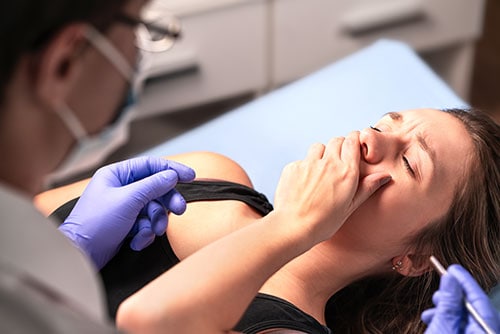Dentin hypersensitivity (DHS) is a common dental problem. However, half of all patients suffering from DHS don't express their pain or tell their dental professional about this problem.
DHS results from open dentinal tubules in exposed dentin, whereby a stimulus such as hot or cold foods and drinks, air being sucked in or touching the area causes movement of fluid within the dentinal tubules that leads to the characteristic short, sharp pain of DHS. This pain can vary for each individual patient, from mild to severe.
There are several reasons why dentin may become exposed, such as:
Overenthusiastic/aggressive brushing
Gingival recession
Treatment for periodontal disease
Dental erosion (erosive wear) associated with exposure to gastric acid (intrinsic acid), such as occurs in individuals with bulimia
Dental erosion (erosive wear) associated with exposure to extrinsic acids, such as consumption of foods and drinks with a low pH (acidic)
Given that patients fail to mention their DHS, not only do dentists need to manage this issue, they also need to screen their patients routinely for this condition. We need to ask patients about their symptoms, and offer solutions to relieve their sensitivity.
Unfortunately, 56% of patients are not satisfied with the solutions recommended to them by their dental professionals. Solutions that are effective in managing DHS include dentifrices containing Pro-Argin technology. This technology works because the arginine, an amino acid which is naturally found in saliva, binds with calcium in saliva and forms a positively-charged complex. This then binds to the negatively-charged dentin surface like a magnet, plugging up the tubules and forming a protective layer which lasts for up to 12 hours. Toothpaste containing Pro-Argin technology has been shown in vitro to provide superior tubule occlusion compared to a desensitizing toothpaste containing stannous fluoride, and to provide superior control of symptoms compared to toothpaste containing 2% potassium ion.
DHS is an issue that occurs during the patients everyday life, however it also has a significant relevance in-office since DHS can occur during treatment, making patients uncomfortable and treatment difficult, such as scaling. Dental Professionals can apply a solution containing Pro-Argin technology before dental treatment, such as Colgate Anywhere Anytime Sensitivity Relief serum which provides relief in 1 minute following application with a fingertip. The patient can also then take the product home and continue using it for relief from DHS at home. Another option, where available, is an in-office application of elmex SENSITIVE PROFESSIONAL Repair and Protect which provides instant relief when applied with a fingertip and massaged into the area for 1 minute. This can also be used at home by the patient up to twice per day for relief from DHS.
Additional home use options for relief from DHS, depending on your location, include Colgate Sensitive Pro-Relief/Colgate Sensitive Instant Relief toothpaste. A further option, Colgate PreviDent 5000 Sensitive, contains 5,000 ppm fluoride plus 5% potassium nitrate.


Was this article helpful?
If you’d like a response, Contact Us.